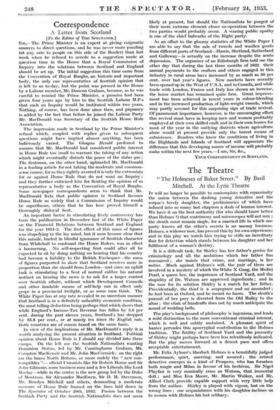The Theatre
" The Holmeses of Baker Street." By Basil Mitchell. At the Lyric Theatre
IT will no longer be possible to contemplate with equanimity the union between the dashing young detective and the corpse's lovely daughter, the preliminaries of 'which have infused into so many last chapters a dash of human interest. We have it on the best authority (for who should know better than Holmes ?) that matrimony and microscopes will not mix ; the sleuth must remain single, for a married life in which one party knows all the other's secrets is an uneasy business. Holmes, a widower now, has proved this by his own experience; and in this play we watch bins trying to stifle an hereditary flair for detection which stands between his daughter and her fulfilment of a woman's destiny.
It is a difficult task, for Shirley has her father's genius for criminology and all the ambitions which her father has renounced ; she insists that crime, not marriage, is her métier. Much against Hohnes's will, the pair of them are involved in a mystery of which the White X Gang, the Medici Pearl, a queen bee, the impotence of Scotland Yard, and the stupidity of Dr. Watson are approved ingredients ; and in the race for its solution Shirley is a match for her father. Providentially, the thief is a scapegrace and no scoundrel ; he had been at Oxford, and he meant no harm. The sleuth's pursuit of her prey is diverted from the Old Bailey to the altar ; the clink of handcuffs does not by much anticipate the sound of wedding bells.
The play's background of philosophy is ingenious, and lends a mild distinction to the more conventional criminal interest, which is well and subtly sustained. A pleasant spirit of banter pervades this apocryphal contribution to the Holmes tradition. The futility of Scotland Yard and the precocity of Shirley might perhaps have been less relentlessly indicated. But the play moves forward at a decent pace and offers acceptable entertainment.
Mr. Felix Aylmer's Sherlock Holmes is a beautifully judged performance, quiet, unerring, and assured ; the retired detective emerges as a kind of Prospero, who- has forsaken both magic and Milan in favour of his beehives. Sir Nigel Playfair is very comically crass as Watson, that immortal dolt ; and Miss Eva Moore, Mr. Martin Walker, and Mr. Alfred Clark provide capable support with very little help from the author. Shirley is played with vigour, but on the wrong lines ; our acquaintance with his daughter inclines us to mourn with Holmes his lost celibacy.






































 Previous page
Previous page